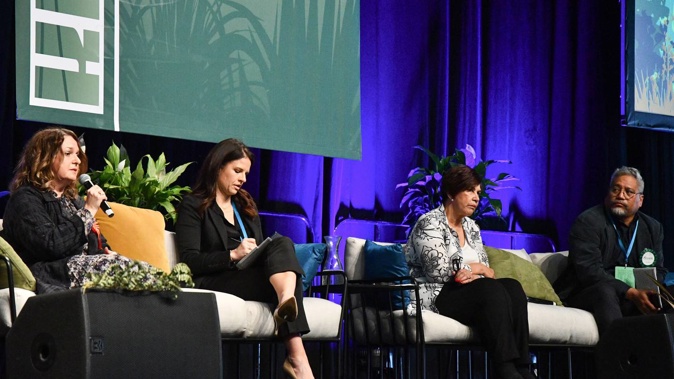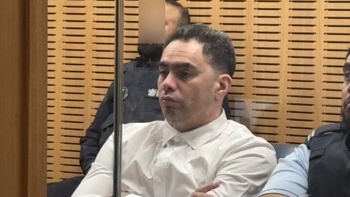

A Tauranga teacher is pleading for children to stop being used as a “political rugby ball”.
Primary school teacher Vanessa Millar spoke to representatives of four political parties at the NZEI Te Riu Roa annual conference, Hui-ā-Tau, held in Rotorua.
“What are your plans to stop our children being a political rugby ball, by making education a cross-party political space?”

The panellists were candidates Jan Tinetti of the Labour Party, National’s Erica Stanford, Merepeka Raukawa-Tait of Te Pāti Māori and the Green Party’s Teanau Tuiono.
Millar’s question received cheers and applause from education colleagues in the audience.
Matua Primary School teacher Vanessa Millar. Photo / Alex Cairns
She later told Local Democracy Reporting that she asked the question as she believed tamariki (children) were “being failed” by constantly-changing policies and the lack of a shared vision was “destroying our future”.
Tinetti, Labour’s education spokeswoman and a former school principal, answered Millar first.
“I’m all for it, I’m sick and tired of it being a political football, I always felt like that when I was in the sector.”
“Our kids are too precious, education should be an area where politics don’t come into it. Other jurisdictions do it.”
/cloudfront-ap-southeast-2.images.arcpublishing.com/nzme/FII5GQCJWVCKHBONTPGGLCJUSE.jpg)
Labour Party Tauranga candidate and Education Minister Jan Tinetti was on the panel. Photo / Laura Smith
“We do not want untested, untried, populist ideas being forced on our kids that are going to create more harm.”
National Party education spokeswoman Stanford’s response was that it was good to have a contest of ideas, no matter the sector. She said debate was healthy.
/cloudfront-ap-southeast-2.images.arcpublishing.com/nzme/4OWHI2HAA5DSDDIB54ZCIBQF24.jpg)
National Party education spokeswoman Erica Stanford. Photo / Laura Smith
“No-one speaks with one whole voice.”
Stanford said she had been careful in the policy she put forward for it to not be “terribly different”.
Raukawa-Tait said cross-party work for the benefit of children “ain’t gonna happen”.
/cloudfront-ap-southeast-2.images.arcpublishing.com/nzme/W7WU45TOYBD6NPCJOPXT6EILXM.jpg)
Te Pāti Māori Rotorua candidate Merepeka Raukawa-Tait. Photo / Laura Smith
“Parties are quite selfish. They think about themselves, they think short-term and are constantly scanning the world for the best ideas and solutions... we’ve got people who want to share their ideas.”
Green Party education spokesman Tuiono agreed with Tinetti: “I reckon we should give it a shot.
“If we get enough parties around the table, maybe we can get somewhere.”
Other questions at the event focused on other challenges the sector had faced in recent times, such as pay parity and resourcing.
/cloudfront-ap-southeast-2.images.arcpublishing.com/nzme/SVTNSMIWSVHZFCOC4I6Z5VFZQA.jpg)
Green Party MP Teanau Tuiono. Photo / Laura Smith
In a nutshell: Education policies
National Party
Includes banning cellphones in schools, requiring all primary and intermediate schools to spend an average of an hour a day each on reading, writing and maths, a curriculum re-write to set out a non-negotiable set of knowledge and skills children will need to be taught each year, and exit exams for graduate teachers.
Labour Party
Includes continuing school lunches, making financial literacy compulsory in schools from 2025, mandating teaching methods for reading, writing and maths from 2026, and providing “guidance, professional development, and materials” to help teachers implement the new rules.
Green Party
Includes ending classroom streaming or grouping by perceived ability, trialling alternative models of school governance to improve inclusivity and self-determination in education, resourcing the universal teaching of te reo Māori and tikanga Māori in all public schools, establishing a unit within the Ministry of Education designed to support schools, and the education system in general, to respond to the voices of children.
Te Pāti Māori
Includes resourcing and valuing kaupapa Māori education including by establishing a $200m fund to drive whānau, hapū and iwi education and training initiatives, overhauling the mainstream education system including by requiring a minimum of 25 per cent of the education budget be directed to Māori models of delivery and pastoral care and remove the power of schools to expel any student younger than the school leaving age of 16, as well as creating pathways for school leavers such as by permanently removing apprenticeship fees.
Laura Smith is a Local Democracy Reporting journalist based at the Rotorua Daily Post. She previously reported general news for the Otago Daily Times and Southland Express, and has been a journalist for four years.
- Public Interest Journalism funded through NZ on Air
Take your Radio, Podcasts and Music with you

/cloudfront-ap-southeast-2.images.arcpublishing.com/nzme/HHW3GNHSU5BDBAF4EGS5LBGHRI.JPG)








